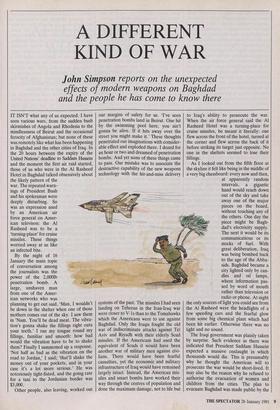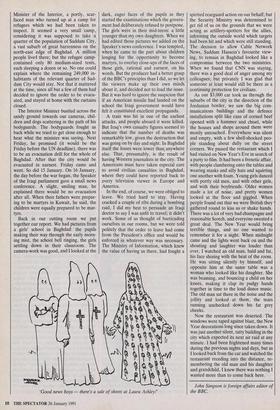A DIFFERENT KIND OF WAR
John Simpson reports on the unexpected
effects of modern weapons on Baghdad and the people he has come to know there
By the night of 16 January the main topic of conversation among the journalists was the power of the 2,0001b penetration bomb. A large, unshaven man from one of the Amer- ican networks who was planning to get out said, Man, I wouldn't be down in the shelter when one of those mothers comes out of the sky. I saw them in 'Nam. You'll be dead meat. The vibra- tion's gonna shake the fillings right outa your teeth.' I ran my tongue round my fillings, familiar and smooth: how bad would the vibration have to be to shake them? Finally I summoned up a response. `Not half as bad as the vibration on the road to Jordan,' I said; 'that'll shake the money out of your pockets, and in your case it's a lot more serious.' He was notoriously tight-fisted, and the going rate for a taxi to the Jordanian border was $3,000.
Other people, also leaving, worked out our margins of safety for us. 'I've seen penetration bombs land in Beirut. One hit by the swimming pool here, you ain't gonna be alive. If it hits away over the street you might make it.' These thoughts penetrated our imaginations with consider- able effect and exploded there. I dozed for an hour or two and dreamed of penetration bombs. And yet none of these things came to pass. Our mistake was to associate the destructive capability of the new weapons technology with the hit-and-miss delivery systems of the past. The missiles I had seen landing on Teheran in the Iran-Iraq war were closer to V-is than to the Tomahawks which the Americans were to use against Baghdad. Only the Iraqis fought the old war of indiscriminate attacks against Tel Aviv and Riyadh with their elderly Scud missiles. If the Americans had used the equivalent of Scuds it would have been another war of military men against civi- lians. There would have been fearful casualties, yet the economic and military infrastructure of Iraq would have remained largely intact. Instead, the American mis- siles and smart bombs have worked their way through the centres of population and done the maximum damage, not to life but to Iraq's ability to prosecute the war. When the air force general said the Al Rasheed Hotel was a turning-place for cruise missiles, he meant it literally: one flew across the front of the hotel, turned at the corner and flew across the back of it before striking its target just opposite. No one in the shelters seemed to lose their ' fillings.
The Iraqi government was plainly taken by surprise. Such evidence as there was indicated that President Saddam Hussein expected a massive onslaught in which thousands would die. This is presumably why he thought the American will to prosecute the war would be short-lived. It may also be the reason why he refused to authorise the evacuation of women and children from the cities. The plan to evacuate Baghdad was made public by the Minister of the Interior, a portly, scar- faced man who turned up at a camp for refugees which we had been taken to inspect. It seemed a very small camp, considering it was supposed to take a quarter of the population of Saddam City, a vast suburb of great barrenness on the north-east edge of Baghdad. A million people lived there; but the refugee camp- contained only 80 medium-sized tents, each sleeping a dozen or so. No one could explain where the remaining 249,000 in- habitants of the relevant quarter of Sad- dam City would stay. Not that it mattered at the time, since all but a few of them had decided to ignore the order to be evacu- ated, and stayed at home with the curtains closed.
The Interior Minister bustled across the sandy ground towards our cameras, chil- dren and dogs scattering in the path of his bodyguards. The bodyguards fought us back while we tried to get close enough to hear what the minister was saying. Next Friday, he promised (it would be the Friday before the UN deadline), there was to be an evacuation drill for the whole of Baghdad. After that the city would be evacuated in earnest. Friday came and went. So did 15 January. On 16 January, the day before the war began, the Speaker of the Iraqi parliament gave a small news conference. A slight, smiling man, he explained there would be no evacuation after all. When their fathers were prepar- ing to be martyrs in Kuwait, he said, the children were equally prepared to be mar- tyrs.
Back in our cutting room we put together our report. We had pictures from a girls' school in Baghdad: the pupils making their way through the early morn- ing mist, the school bell ringing, the girls settling down in their classroom. The camera-work was good, and I looked at the dark, eager faces of the pupils as they started the examinations which the govern- ment had deliberately refused to postpone. The girls were in their mid-teens: a little younger than my own daughters. When we had edited those pictures we added on the Speaker's news conference. I was tempted, when he came to the part about children longing for the opportunity to become martyrs, to overlay close-ups of the faces of those girls, rational and earnest, on his words. But the producer had a better grasp of the BBC's principles than I did, so we let the viewers make up their own minds about it, and decided not to load the issue. But it was hard to ignore the suspicion that if an American missile had landed on the school the Iraqi government would have felt it constituted excellent propaganda.
A train was hit in one of the earliest attacks, and people aboard it were killed. But Iraq's own casualty figures seemed to indicate that the number of deaths was remarkably low, given the destruction that was going on by day and night. In Baghdad itself the losses were lower than, anywhere else. That, presumably, is the result of having Western journalists in the city. The Americans must have taken especial care to avoid civilian casualties in Baghdad, where they could have reported back to every television viewer in Europe and America.
In the end, of course, we were obliged to leave. We tried hard to stay. Having cracked a couple of ribs during a bombing raid, I did my best to persuade an Iraqi doctor to say I was unfit to travel; it didn't work. Some of us thought of barricading ourselves in our rooms, but we were told politely that the order to leave had come from the President's office and would be enforced in whatever way was necessary. The Ministry of Information, which knew the value of having us there, had fought a `Good news boys — there's a sale of sheets at Laura Ashley!' spirited rearguard action on our behalf; but the Security Ministry was determined to get rid of us on the grounds that we were acting as artillery-spotters for the allies, informing the outside world which targets had been hit and which were still standing. The decision to allow Cable Network News, Saddam Hussein's favourite view- ing, to remain in Baghdad looked like a compromise between the two ministries. When we found that CNN was staying, there was a good deal of anger among my colleagues; but privately I was glad that someone at least would still be there as a continuing protection for civilians.
As our $3,000 car took us through the suburbs of the city in the direction of the Jordanian border, we saw the big com- munications buildings and the defence installations split like cans of corned beef opened with a hammer and chisel, while the houses and shops around them were mostly untouched. Everywhere was silent and empty, with a few shell-shocked peo- ple standing about dully on the street corners. We passed the restaurant which I had visited on New Year's Eve in search of a party to film. It had been a frenetic affair, with people clambering onto the tables and wearing masks and silly hats and squirting one another with foam. Young girls danced with portly old men, and with other girls, and with their boyfriends. Older women made a lot of noise, and pretty women looked at the floor and giggled. When people found out that we were British they gathered round to kiss us or shake hands. There was a lot of very bad champagne and reasonable Scotch, and everyone sweated a great deal. The New Year would bring terrible things, and no one wanted to remember it for a night. When midnight came and the lights went back on and the shouting and laughter was louder than ever, I watched an old man, bald and fat, his face shining with the heat of the room. He was sitting silently by himself, and opposite him at the same table was a woman who looked like his daughter. She was beaming, and bouncing a child on her knees, making it clap its pudgy hands together in time to the loud dance music. The old man sat there in the noise and the jollity and looked at them, the tears running unchecked down his fat grey cheeks.
Now the restaurant was deserted. The windows were taped against blast, the New Year decorations long since taken down. It was just another silent, tatty building in the city which expected its next air raid at any minute. I had been frightened many times during the previous nights and days, but as I looked back from the car and watched the restaurant receding into the distance, re- membering the old man and his daughter and grandchild, I knew there was nothing I wanted more than to come back here.
John Simpson is foreign affairs editor of the BBC.



























































 Previous page
Previous page